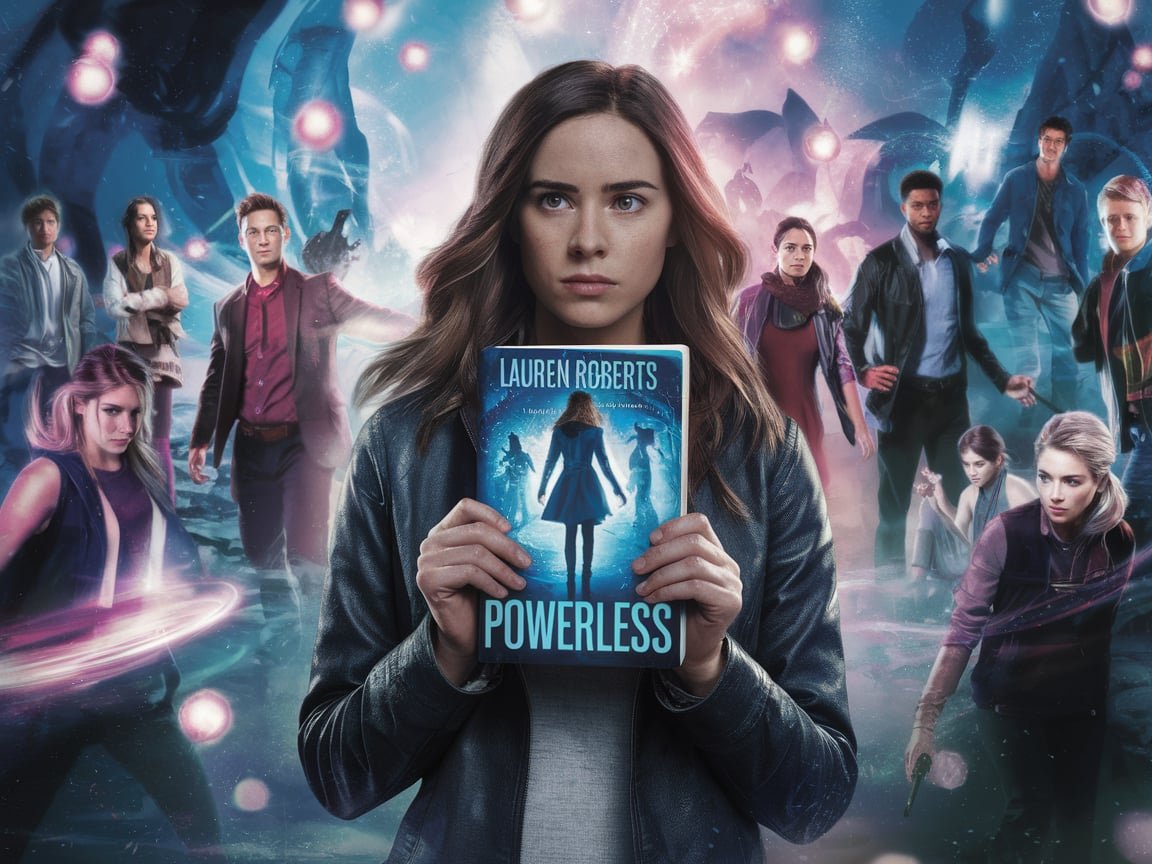Lauren Roberts‘ debut novel “Powerless” bursts onto the young adult fantasy scene with a bang. It spins a tale that flips our understanding of power, identity, and personal choice on its head. Let’s dive into this magical world where having no powers makes you an outsider.
Content Table
A World Buzzing with Magic
Imagine a place where magic isn’t just real – it’s everything. In “Powerless,” your magical ability defines you. It shapes your social status, your job prospects, and even your relationships. At first glance, this world might seem amazing to us non-magical folks. But Roberts cleverly peels back the layers, revealing a society full of complexities and unfairness.
Enter Paedyn Gray, our hero with a big secret: she has no magic at all. In a world where magic means everything, Paedyn has nothing. This makes her different, and in her society’s eyes, disabled. From this starting point, Roberts weaves a story about finding your place, understanding who you are, and questioning what gives someone power.
Themes That Hit Home
Rethinking Power and Disability
Roberts doesn’t pull any punches when exploring power and disability. By flipping the script and making lack of magic a disability, she forces us to think hard about how we view ability in our world. As we follow Paedyn’s journey, we can’t help but ask: What makes someone powerful? Is it all about what you can do, or is there more to it?
The book doesn’t shy away from showing the tough realities Paedyn faces. She deals with discrimination and challenges that mirror the real-world struggles of people with disabilities. It shines a light on how society can put up walls – both physical and social – based on perceived differences.
Embracing Who You Are
At its heart, Paedyn’s story is about discovering and accepting herself. She has to hide who she is, which leads to some serious soul-searching. Many readers, no matter their age, will relate to her internal struggle. The pressure to fit in, the fear of being found out, the battle between hiding and being true to yourself – these are issues we all face at some point.
As Paedyn navigates her magical world, we’re pushed to think about our own lives. How much of ourselves do we hide to blend in? What price do we pay for following society’s rules? These questions go beyond the fantasy setting, touching on real issues of identity and self-expression.
Family Ties and Friendships
Roberts doesn’t just focus on Paedyn in isolation. She skillfully explores how Paedyn’s secret affects her relationships, especially with her family. These family dynamics offer a smaller version of the bigger issues at play in society. Love, expectations, disappointment, and family legacy all tangle together, creating a complex web of emotions and motivations.
Through Paedyn’s interactions with family, friends, and potential love interests, the book digs into the nitty-gritty of trust, loyalty, and boundaries in relationships. It raises thought-provoking questions about unconditional love and acceptance, especially when faced with societal pressure.

A World That Feels Real
One of the best things about “Powerless” is how Roberts builds her world. The magic system is detailed but easy to understand. We get a clear picture of how magic works in this society without drowning in unnecessary details. The different types of magic, how they show up, and how they affect daily life are woven seamlessly into the story. This creates a world that feels both fantastical and grounded.
The way society is structured around magic – from schools to jobs – is well thought out. This solid foundation makes the story’s conflicts feel more real and impactful.
Characters You’ll Care About
While Paedyn is the star of the show, “Powerless” is full of well-developed supporting characters that add depth to the story. From family members wrestling with their expectations to friends who may or may not be trustworthy, each character brings a unique perspective to the book’s main themes.
The relationships Paedyn forms and the challenges she faces in maintaining them paint a realistic picture of teenage life, even in a magical setting. Roberts shows a deep understanding of the complexities of young adult emotions and social dynamics, creating characters readers can relate to and root for.
A Story That Keeps You Hooked
Roberts’ writing style in “Powerless” strikes a good balance. She gives us quiet moments to dive deep into Paedyn’s thoughts and feelings but also throws in plenty of action to keep the plot moving. The pacing works well, with tense, revealing moments mixed in with calmer scenes that develop the characters.
Telling the story from Paedyn’s point of view lets us get into her head. This works particularly well for a story that deals so much with identity and self-perception. It allows readers to fully immerse themselves in Paedyn’s world and understand her struggles.
More Than Just Fantasy
While “Powerless” is a fantasy novel, it also serves as a lens for examining real-world issues. The book’s exploration of power dynamics, discrimination, and treatment of those seen as “different” offers thoughtful commentary on current social problems.
How the magical society treats the powerless can be seen as a stand-in for various forms of discrimination in our world. By putting these issues in a fantasy context, Roberts lets readers engage with difficult topics in an accessible and thought-provoking way.
Moreover, the book raises important questions about ability and disability. It challenges readers to rethink their views and biases. It promotes a more inclusive understanding of power and worth, suggesting that true strength comes in many forms, not all of them obvious or valued by society.
Making Waves in Young Adult Literature
“Powerless” enters the young adult fantasy genre at a time when people are talking a lot about representation, diversity, and inclusion. By focusing on a hero who’s considered “disabled” in her world, Roberts adds to the growing body of literature that aims to show a wider range of experiences and perspectives in young adult fiction.
The book’s themes of self-acceptance and challenging societal norms connect with the coming-of-age experiences of many young readers. It sends a powerful message about the importance of being true to yourself, even when that goes against what society expects.
Furthermore, “Powerless” shows how fantasy literature can address real-world issues in ways that engage and resonate with young readers. It proves that fantasy can be more than just an escape – it can be a way to explore complex social and personal issues.

Wrapping Up: A Strong Start
Lauren Roberts’ “Powerless” makes a splash in young adult fantasy. It offers readers a richly imagined world that sets the stage for exploring timeless themes of identity, power, and acceptance. Through Paedyn’s journey, we’re pushed to question our assumptions about power and ability and to think about the courage it takes to be true to ourselves in a world that values fitting in.
The book’s strengths lie not just in its creative premise and well-built world, but in its deep character development and nuanced handling of complex themes. Roberts has created a story that’s both fantastical and deeply relatable, offering insights into the human experience for readers of all ages.
As a first novel, “Powerless” marks Lauren Roberts as an author to watch in young adult fantasy. It sets a high bar for thoughtful, socially conscious fantasy that doesn’t sacrifice good storytelling for its message. If you’re looking for a fantasy novel that goes beyond typical tropes to offer a meaningful exploration of power, identity, and self-acceptance, “Powerless” should be at the top of your reading list.
In a world that often seems to value only certain types of power and ability, “Powerless” reminds us that true strength comes in many forms. It challenges us to look beyond the surface, to value the power within each person, and to create a society that recognizes and celebrates everyone’s diverse abilities. In doing so, it offers not just an engaging story, but a vision of a more inclusive and understanding world – a powerful message indeed.





